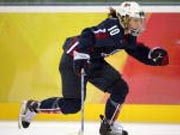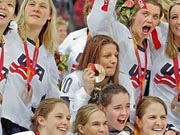KIM INSALACO
A Closer Look
Words of Wisdom
Inspiring messages:
Kim had some a very inspring message for girls of all ages. Click HERE to hear Kim's advice.
“Do what you love. No matter what. No matter how hard it gets and no matter what kind of struggle is put on you in terms of financial, emotional and physical. You know it’s going to be hard but do it anyway and push through and keep doing it because you love it. It’s a follow your heart type thing but don’t ignore it if it gets hard.”
I’ve had such good fortune over the last 6 months if not the last 4 years that I have to give back and do this stuff and let people know my story. It’s not a special interest story but I’m just a normal kid from this blue collar place and to be able to do what I’ve done, all I did was follow what I really loved to do yet I had all these barriers. But that’s just life, whether it’s a sport, or a job, or school, everyone goes through this stuff, they go through these hard, hard things but I just wanted people to know, yeah, I got to go to the Olympics, I got to go to the White House, but I went through so much shit to get there but it was so worth it because of the people I got to meet and the things I got to do it was so worth it but like I said it’s not easy but if it’s what you love you have to do it.
Transition from College to National level hockey:
The transition from college hockey to national level competition was really hard on Kim. Kim saw role change a lot on the national team. She was more of a role player at Brown and with Team USA she was more of a 3rd or 4th line, penalty killer grinder player rather than a goal scorer. Kim was not that go-to player anymore. Kim had to learn her role while trying to prove herself every day and found that being around the elite athletes and these well rounded over achievers who were talented in so many ways outside of hockey was difficult. Kim was around such successful, driven people that it made her feel like what she was doing was never good enough. It was hard at first but the biggest lesson she learned was that it made her realize that just being there was special and enough and she needed to relish the moment and learn how to take it all in. Kim didn’t have to be the star player because the people who formed her team was enough.
Her favorite memories all involve her teammates and the people she met through her hockey experiences. Kim’s favorite on-ice memories include doing the Team USA cheer in the middle of the ice after practices and when all 20 players of the team would salute the crowd after their Olympic games.
How to overcome struggles, physical and emotional:
Kim has had lived through many highs and lows during her 20 years as a hockey player. From dealing with being the only girl in the Rochester Hockey League to going through the heart breaking experiences of being cut from her dream team more than once, Kim has overcome this and created a life full of success, inspirational to others.
Kim has undergone many struggles in life and hockey. Kim has lived through many ups and downs
in her life. She had to battle past being cut from the Olmpic team in 2001 to make the 2003 Team
USA where she found out only days before the World Championship tournament that they were to be
cancelled due to SARS in Beijiing, China. This was devastating because she wasn't positive she
would ever play on a National Team again. Kim worked hard to make the team again.
Kim had a few words about how it felt to be a ‘bubble’ hockey player where a spot on the team
was never a guarantee. Former Team USA captain herself, Cammi Granato was cut from the Olympic
team the year following their victory at the World Championships proving that nothing in life is
certain. The experience was physically draining.
“Gettting cut in 2004, it was a rollercoaster making it in 2003, getting cut in 2004. I was always making it, getting cut, making it, getting cut and this year, everything was on this team, my life was on hold for this team that I wasn’t even on in 2005, so I went into the camp in 2005 with the attitude that I’m going to finish this, and make the Olympic team.”
One of Kim’s toughest physical injuries was also one of her greatest emotional battles. The toughest injury
Kim had to surmount was when she tore her cartilage in her knee after making the team in August 2005. The team
was in Finland for the 4 Nations Cup in September of 2005 and while they were playing Canada in the finals,
Caroline Ouellette fell on her knee awkwardly. Kim skated to the bench knowing something was wrong, and when
she sat down, she decided to keep her injury to herself. Kim sat there in pain and would not tell anyone about
the injury because she was undergoing the personal struggle of not wanting to tell anyone she was hurt because
she was unsure that she would ever be given this Olympic opportunity again. When her shift came up she her
team that she could not go out. She was left sitting on the bench thinking, “This dream that I had is done”.
It had been the second shift of the first period and she could barely walk after this injury so she had to
sit out the rest of the game. She had to watch her teammates go out to play for the rest of game. Kim flew
straight home and had her surgery immediately. The mental stress was incredible. She stayed behind in Lake
Placid while the rest of the team traveled and she kept thinking she wasn’t sure if she was going to be able
to come back. “It was extremely draining but it made me a stronger person” says Kim about the injury because
she proved people wrong and came back from the injury to win a Bronze medal with the team.
How to deal with the expectation of success as Team USA
Kim commented on how the team dealt with the loss to Sweden to come back and win the
Bronze medal game versus Finland. Kim gave advice on how to boost the morale of a team
and win despite the devastating loss the game prior to the Finland game.
A lot of communication. The team worked with a sport psychologist because they knew they
were going to need a lot of help. Team USA worked with the sport psychologist twice
immediately following their loss to Team Sweden and again right before the game. They
knew that they could not pull apart and stay together for one more game and bring home a
medal. The team “took the spin that they don’t give out medals you have to earn them” “took the spin that they don’t give out medals you have to earn them”and
had to swallow the pride of that that they were going to have to go out and earn a medal
even if it’s not the color that the entire home country including themselves had expected
and desired. The team realized they needed to be proud that they were going to win a medal
and a lot of athletes don’t get to do that.
Hard Work and Sacrifice:
20 years of hard work towards her medal and she found that over the last 10 years, every decision she made was made because that was her dream. Every decision was made for hockey. So many things were sacrificed for that single medal and the feeling of winning a medal gave her such a feeling of pride, she cried when she was awarded with the medal.
Kim realizes now that you can’t let something like hockey take away from relationships you make throughout life. Kim admits that her commitment to hockey and her dedication may have been a flaw in her personality. Her driven nature to achieving her goals in hockey affected her social life and caused her to be less available. Kim has since improved her lifestyle and has since learned the importance of her friends. Hockey has allowed her to formed many relationships with athletes and staff that she still enjoys and keeps.
Teamwork:
The biggest thing she learned this Olympic year is that being on a team is very hard. The individual versus being a team and being selfless and giving yourself up for the group is a very hard concept to fully grasp. Ultimately only a few people will get the credit on a team. Maybe one person, the one who got the game winning goal, or the goalie will get all the credit but learning as a group how to deal with that was extremely important to Kim. There were 5 members from the team were featured in Glamour Magazine as well as 3 in People Magazine. The team sat down as a group and discovered together how have jealousy disrupt the team. Being a team means finding that selfless character.
![]()


